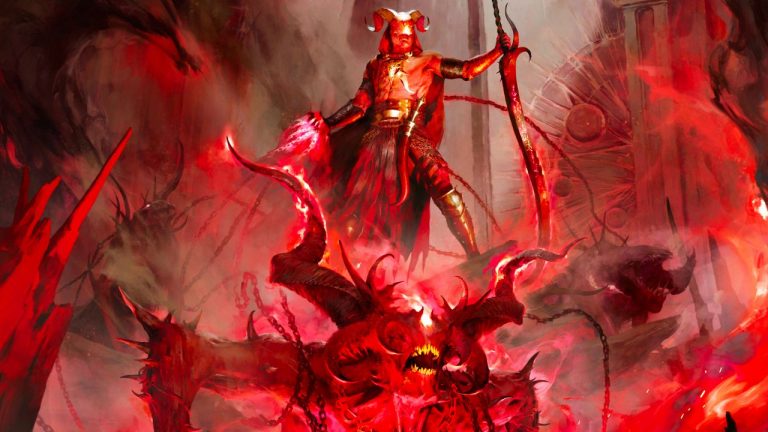In the mystical realms of Dungeons & Dragons, curses are more than just bad luck or minor inconveniences. They’re powerful magical afflictions that can turn even the mightiest hero into a bumbling novice, stripping away their most prized abilities and leaving them vulnerable in the face of danger. From the dreaded Bestow Curse spell to the terrifying gaze of a mummy lord, these arcane maledictions can fundamentally alter a character’s capabilities, creating both challenges and opportunities for rich storytelling.
Picture this: your party’s barbarian, once able to cleave through hordes of enemies with ease, now struggles to lift his greataxe above his head. Or imagine the silver-tongued bard, renowned throughout the land for her persuasive abilities, reduced to stammering and awkward silences in the face of a crucial negotiation. These scenarios aren’t just frustrating for players – they’re the stuff of epic tales, where heroes must overcome not just external foes, but their own magically-imposed limitations.
Ability-targeting curses add a layer of complexity and drama to D&D adventures that simple damage or status effects can’t match. They force players to adapt their strategies, rethink their characters’ roles within the party, and often drive the narrative in unexpected directions. Whether temporary setbacks or long-term afflictions, these curses ensure that every adventure is fraught with magical peril and the potential for heroic triumph against the odds.
The Nature of Ability-Draining Curses
Curses that target abilities are among the most feared and respected in the world of D&D. Unlike simple damage or fleeting status effects, these curses strike at the very core of a character’s capabilities, often with far-reaching consequences for both mechanics and roleplaying.
Temporary vs. Permanent Curses
The duration of ability-draining curses can vary widely, adding an extra layer of tension to their effects:
Temporary Curses: Some curses are fleeting, lasting only a few rounds of combat or until the next long rest. These short-term afflictions can still turn the tide of a crucial battle or social encounter, forcing players to think on their feet and adapt quickly. Examples include:
The effects of a low-level Bestow Curse spell
A banshee’s Horrifying Visage, temporarily reducing a character’s Charisma
A ghoul’s paralyzing touch, briefly nullifying a character’s physical abilities
Permanent Curses: Other curses can be devastatingly permanent, requiring powerful magic, specific quest conditions, or divine intervention to remove. These long-lasting afflictions can shape a character’s entire arc, becoming a central focus of their development. Some notable examples:
The infamous Deck of Many Things card that permanently reduces a character’s Intelligence
A powerful hag’s curse that gradually drains a character’s Strength over time
A cursed magic item that slowly erodes the wielder’s Wisdom with each use
Types of Ability Curses
In D&D, curses can affect any of the six primary abilities, each with its own unique flavor and consequences:
Strength Curses:
Physical weakness, difficulty wielding weapons or carrying equipment
Reduced damage output for melee attacks
Trouble with athletics checks like climbing or swimming
Dexterity Curses:
Clumsiness and lack of coordination
Lowered Armor Class, making the character more vulnerable to attacks
Difficulty with stealth, acrobatics, and fine motor skills
Constitution Curses:
Reduced hit points and general vitality
Vulnerability to diseases and poisons
Trouble maintaining concentration on spells
Intelligence Curses:
Dulled mental acuity and memory loss
Difficulty with knowledge-based skills and arcana checks
For wizards and artificers, potential loss of spellcasting abilities
Wisdom Curses:
Impaired judgment and diminished perceptiveness
Vulnerability to mind-affecting spells and abilities
For clerics and druids, weakened connection to their divine or natural powers
Charisma Curses:
Loss of force of personality and persuasive abilities
Difficulty with social interactions and performance-based skills
For sorcerers, bards, and warlocks, potential reduction in spellcasting power
Each type of ability curse not only affects the mechanical aspects of gameplay but also provides rich opportunities for character development and storytelling. A once-proud paladin struggling with a Charisma-draining curse might question their faith and purpose, while a sage wizard afflicted by an Intelligence curse could embark on a poignant journey to reclaim their lost knowledge.
Notable Curses in D&D Lore
The worlds of D&D are rife with legendary curses that have shaped the fates of heroes and villains alike. Let’s explore some of the most infamous ability-draining curses in D&D lore:
The Bestow Curse Spell
This versatile 3rd-level necromancy spell is a favorite among evil spellcasters and vindictive NPCs. It allows the caster to inflict a variety of debilitating effects, including:
Imposing disadvantage on ability checks and saving throws for a specific ability score
Causing the target to have a 50% chance of losing their action each turn
Making the target vulnerable to a specific damage type
While not permanently damaging, Bestow Curse can be devastating in the short term, especially when cast by a powerful spellcaster who can maintain concentration for extended periods.
Mummy’s Curse
Few curses in D&D inspire as much dread as the rotting touch of a mummy. This powerful malediction gradually drains the victim’s strength and vitality, manifesting as a wasting disease that resists magical healing. The effects typically include:
A cumulative penalty to all ability scores, increasing each day
Inability to regain hit points through normal rest
A slow, horrifying physical transformation that, if left unchecked, can turn the victim into a mummy themselves
The mummy’s curse is notoriously difficult to remove, often requiring a combination of powerful magic and specific ritual components tied to the mummy’s origin.
Feeblemind
This devastating 8th-level enchantment spell is the bane of intellectuals and spellcasters throughout the multiverse. Its effects include:
Reducing the target’s Intelligence and Charisma scores to 1
Rendering the victim unable to cast spells, activate magic items, understand language, or communicate intelligently
Leaving the target able to identify friends and follow simple commands, but little else
Feeblemind is particularly cruel because it leaves its victims aware enough to understand their profound loss but unable to do anything about it. Breaking this curse often requires the most powerful of restorative magics.
The Sword of Kas
This legendary artifact, once wielded by Vecna’s most trusted lieutenant, carries a terrifying curse. While it grants great power, it also:
Gradually erodes the wielder’s own will, replacing it with the sword’s malevolent personality
Can permanently reduce the user’s Charisma score each time they’re brought to 0 hit points while attuned to the weapon
Eventually compels the wielder to betray and destroy their allies, mimicking Kas’s own betrayal of Vecna
The Sword of Kas demonstrates how even the most powerful magical items can carry curses that target a character’s very essence.
Understanding these notable curses provides both players and Dungeon Masters with a rich tapestry of lore to draw upon when incorporating ability-draining afflictions into their games. Whether used as central plot devices or looming threats, these curses add depth and gravitas to any D&D campaign.
Mechanical Effects of Ability Curses
Ability-draining curses can have far-reaching effects on a character’s performance, impacting nearly every aspect of gameplay. Understanding these mechanical consequences is crucial for both players and Dungeon Masters:
Reduced Ability Scores
The most direct impact of ability curses is the reduction of one or more ability scores. This can have cascading effects:
Lower modifiers for related skill checks and saving throws
Decreased passive scores (like Passive Perception for Wisdom)
Potential loss of bonus spells for spellcasters who rely on specific ability scores
Spellcasting Complications
For spellcasters, ability curses can be particularly devastating:
Reduced spell save DCs, making it easier for enemies to resist spells
Lower spell attack bonuses, decreasing the chances of landing crucial magical attacks
Potential inability to cast certain spells if the relevant ability score drops too low
For prepared casters like Clerics and Druids, a reduction in the number of spells they can prepare each day
Combat Ineffectiveness
Physical combatants aren’t spared from the effects of ability curses:
Lowered attack bonuses, making it harder to hit enemies
Decreased damage output, especially for Strength-based melee attacks
Reduced AC from lowered Dexterity, making the character more vulnerable
Potential inability to use certain weapons or wear certain types of armor if Strength drops too low
Skill Challenge Struggles
Ability curses can turn once-simple tasks into significant challenges:
Athletics checks (like climbing or swimming) become more difficult with reduced Strength
Stealth and acrobatics may become nearly impossible with a severe Dexterity curse
Intelligence-based knowledge checks might yield no results for a cursed scholar
A charismatic face of the party might become a liability in social situations if hit with a Charisma curse
Class Feature Limitations
Many class features rely on specific ability scores to function:
A monk’s AC and several abilities rely heavily on Wisdom and Dexterity
Barbarian’s Unarmored Defense and Rage damage bonus are tied to Constitution
Paladins and Clerics might find their divine abilities weakened by Charisma or Wisdom curses
Magic Item Restrictions
Some magic items have ability score requirements to attune or use effectively:
A character might suddenly find themselves unable to attune to a favorite magic item
Items that base their effects on the user’s ability scores (like a Helm of Brilliance) become less effective
Hit Point Reductions
Curses that affect Constitution can have a direct impact on a character’s hit points:
Maximum hit points may be reduced
Hit dice healing becomes less effective
Concentration on spells becomes more difficult to maintain
Roleplaying Cursed Characters
While mechanically challenging, ability-draining curses offer rich opportunities for roleplaying and character development. Here’s how players and DMs can make the most of these afflictions:
Embracing the Struggle
Encourage players to lean into their character’s newfound limitations:
A once-graceful rogue might now stumble and fumble, providing both comedy and pathos
An intelligent wizard reduced to animal-like intelligence could lead to poignant moments of frustration and determination
A charismatic leader struggling to inspire could explore themes of self-doubt and resilience
Adapting Tactics
With key abilities compromised, characters must find new ways to contribute:
A warrior with cursed strength might focus on tactical leadership instead of front-line fighting
A bard with diminished Charisma could explore other aspects of their versatile class, like support spells
Players can use this opportunity to explore multiclassing or unconventional skill use
Character Development
Curses can be powerful catalysts for character growth:
How does the character cope with their new limitations?
Do they become bitter and resentful, or find inner strength and adaptability?
How does this experience change their worldview or relationships with others?
Party Dynamics
A cursed character can change the entire group’s dynamic:
Other party members might need to step up to cover the cursed character’s weaknesses
This can lead to deeper bonds and understanding between characters
Alternatively, it might create tension if the curse puts the party at risk
Quest for a Cure
The search for a way to break the curse can become a driving force for the campaign:
Research montages in ancient libraries
Perilous journeys to consult with legendary healers
Moral dilemmas as the price for removing the curse is revealed
Temporary Acceptance
Sometimes, the best course might be to accept the curse temporarily:
How does the character adapt to their new normal?
What new skills or perspectives do they gain from this experience?
This can lead to interesting character choices when a cure is finally available – do they want to go back to how they were before?
Breaking the Curse
Removing an ability-draining curse often requires more than just a simple Remove Curse spell. Here are some classic ways to break these powerful maledictions:
Seek Out a Legendary Healer
Journey to find a famed cleric or mystic healer
Gather rare components for a complex restoration ritual
Complete a task for the healer in exchange for their services
Undertake a Perilous Quest
Retrieve water from a sacred spring deep in monster-infested territory
Climb to the peak of a cursed mountain to receive a blessing from an ancient spirit
Navigate a ever-changing magical labyrinth to reach a curse-breaking altar
Defeat the Curse’s Source
Track down and confront the being who originally placed the curse
Destroy a cursed artifact that’s the source of the affliction
Close a planar rift that’s allowing the curse’s power to persist
Retrieve a Rare Magical Artifact
Reassemble the scattered pieces of a legendary curse-breaking wand
Negotiate with a powerful extraplanar entity for a reality-altering wish
Dive into the depths of a long-lost dungeon to find a fabled elixir of restoration
Divine Intervention
Complete a series of trials to prove worthy of a deity’s assistance
Gather followers and establish a new temple to curry divine favor
Undertake a dangerous pilgrimage to a site of great religious significance
Embrace and Overcome
In some cases, the key to breaking the curse lies within:
The character must come to terms with a deep-seated fear or flaw
Overcome a moral challenge that forces growth and self-reflection
Achieve a seemingly impossible task through sheer force of will, proving stronger than the curse
Remember, the journey to break the curse can be just as compelling as the curse itself, offering opportunities for character growth, world exploration, and epic storytelling.
Integrating Ability Curses into Your Campaign
For Dungeon Masters looking to incorporate ability-draining curses into their games, here are some tips and ideas:
As Plot Hooks
Start a campaign with one or more characters already under the effect of a mysterious curse
Introduce a cursed item with great power but at a heavy ability score cost
Have a major NPC suffer from a curse, motivating the party to help
For Atmosphere
Describe an ancient tomb where explorers risk ability-draining curses with every trap and treasure
Create a “cursed land” where prolonged exposure slowly saps certain abilities
Use curses as a consequence for defiling sacred sites or angering powerful entities
As Character Arcs
Work with a player to design a curse that ties into their character’s backstory
Allow characters to voluntarily take on a curse in exchange for power or knowledge
Use the removal of a long-standing curse as a major character milestone
Balancing Challenges
Adjust encounter difficulty to account for cursed characters’ new limitations
Provide alternative paths to success that don’t rely solely on ability checks
Offer temporary magical aids to offset curse effects for crucial missions
Ethical Dilemmas
Present situations where using a cursed item could save lives but at great personal cost
Explore themes of sacrifice and redemption through curse-related quests
Create scenarios where removing one character’s curse might inadvertently curse another
By incorporating ability-draining curses into your D&D campaign, you can create memorable challenges that test your players’ creativity and roleplaying skills. These afflictions add depth and drama to your game, ensuring that every adventure is fraught with magical peril and the potential for heroic triumph. Whether used as central plot devices or looming threats, curses that target abilities offer a rich vein of storytelling potential that can elevate your D&D experience to new heights of excitement and narrative depth.
The post Curses That Target Abilities: Weakening Your DND Characters appeared first on LitRPG Reads.












